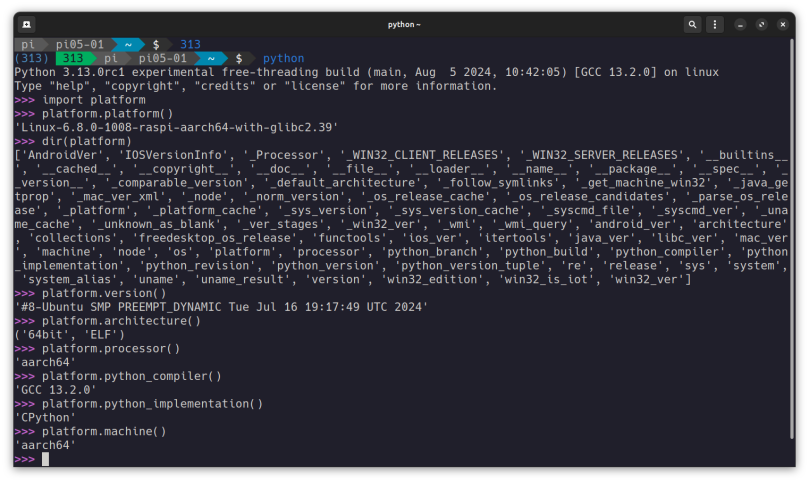 Espressif released ESP-IDF version 5.2.3 two days ago from the date of this post. I installed a copy and then compiled the latest version of MicroPython I have on my system. When I then flashed the build onto one of my Espressif boards, an ESP32-S3 N32R8 DevKit C board, the MicroPython software crashed, performing an infinite boot loop. This is one cycle of the boot loop I recorded via Thonny plugged into the board’s micro USB port.
Espressif released ESP-IDF version 5.2.3 two days ago from the date of this post. I installed a copy and then compiled the latest version of MicroPython I have on my system. When I then flashed the build onto one of my Espressif boards, an ESP32-S3 N32R8 DevKit C board, the MicroPython software crashed, performing an infinite boot loop. This is one cycle of the boot loop I recorded via Thonny plugged into the board’s micro USB port.
MPY: soft rebootMemory: 8,308,816 MB Flash: 8,388,608 MB Platform: MicroPython 1.24.0 preview xtensa IDFv5.2.3 Unique ID: 68B6B33D7814 SSID: ESP32S3-7814 CPU Clock: 160,000,000 Hz I2C: SoftI2C(scl=2, sda=1, freq=500000) I2C: Devices found: ['0x3d'] I2C: SSD1306 OLED FoundA fatal error occurred. The crash dump printed below may be used to helpdetermine what caused it. If you are not already running the most recentversion of MicroPython, consider upgrading. New versions often fix bugs.To learn more about how to debug and/or report this crash visit the wikipage at: https://github.com/micropython/micropython/wiki/ESP32-debuggingMPY version : v1.19.1-2669.g17d823445.dirty on 2024-09-27IDF version : v5.2.3Machine : Generic ESP32S3 module with Octal-SPIRAM with ESP32S3Guru Meditation Error: Core 1 panic'ed (LoadProhibited). Exception was unhandled.Core 1 register dump:PC : 0x4005544b PS : 0x00060830 A0 : 0x82007cc1 A1 : 0x3fcbb590 A2 : 0x00000000 A3 : 0x3c131a50 A4 : 0x00000000 A5 : 0x3fcbb5e4 A6 : 0x00000000 A7 : 0x00000001 A8 : 0x82008a70 A9 : 0x3fcbb540 A10 : 0x00000000 A11 : 0x3fca4184 A12 : 0x00000001 A13 : 0xffffffff A14 : 0x00000000 A15 : 0x3fca41ac SAR : 0x00000016 EXCCAUSE: 0x0000001c EXCVADDR: 0x00000000 LBEG: 0x400570e8 LEND: 0x400570f3 LCOUNT : 0x00000000 Backtrace: 0x40055448:0x3fcbb590 0x42007cbe:0x3fcbb5a0 0x4200837e:0x3fcbb5e0 0x4200dcbe:0x3fcbb610 0x42015279:0x3fcbb630 0x42015341:0x3fcbb650 0x40378e76:0x3fcbb670 0x4200ddc7:0x3fcbb710 0x42015279:0x3fcbb780 0x42015341:0x3fcbb7a0 0x40378e76:0x3fcbb7c0 0x4200ddc7:0x3fcbb860 0x42015279:0x3fcbb8b0 0x4201528e:0x3fcbb8d0 0x42022fef:0x3fcbb8f0 0x42023347:0x3fcbb980 0x42006922:0x3fcbb9b0
Lines 3 through 11 are output by my software. Line 14 is where the crash dump starts. All the output text my software prints comes from a single file, boot.py, which is the first file that is always executed. The next file to be executed is main.py, which is where the NeoPixel is exercised (it displays six colors then turns off). The last thing main.py does is instantiate an instance of my web server, then kick it off. I suspect that the crash has something to do with the built-in WiFi radio.
At this point I’ve simply dropped back from 5.2.3 to 5.2.2, recompiled MicroPython, re-flashed my board, and get it running happily again, just like it was doing before I tried to step up to the latest ESP-IDF release.
I have no idea why it’s crashing, and I have no desire to go looking. Since there’s nothing special in version 5.2.3 that I just have to have, I’ll stick with version 5.2.2 for building MicroPython, and version 5.3.1 for writing C++ for the Espressif chips. Be advised that ESP-IDF 5.2.3, at least for the ESP32-S3 in this circumstance, has a critical internal problem.


You must be logged in to post a comment.